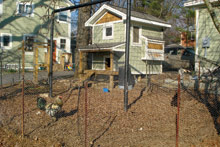Instead of a chicken in every pot, some determined Asheville residents would like backyard chickens allowed at every home that wants them—and can keep their coops clean. “We’re advocating for responsible and informed [chicken] ownership,” says Cathy Williams of Asheville City Chickens.

The grass-roots group has become a social-networking phenom, with supporters flocking to its blogs, Facebook, Yahoo and Twitter sites. In the past year, Williams and other advocates have also been setting up info booths at local tailgate markets, meeting with city staff and contacting elected officials.
Their collective voice has been heard: A public hearing last summer has led to a proposed revision of the city’s animal ordinance, which includes rules about chickens and chicken coops. Among other things, city staff have suggested allowing coops within 50 feet of other homes (down from the current 100 feet). City Council will review the draft revision at a new public hearing during their April 28 meeting.
But the proposed changes don’t go far enough, Asheville City Chickens maintains. “We’re asking for 25 feet,” says Josh O’Conner, noting that in many neighborhoods, even 50 feet makes it almost impossible to keep chickens. The group also wants to ban roosters in the city (they’re too noisy), limit flock size to further reduce noise and odor, and minimize enforcement costs by requiring on-site inspections of chicken coops only when there’s a complaint.
More and more American cities are allowing backyard chickens, adds Williams. After she and longtime friend Jenny Mercer organized to get the first public hearing on the issue here, the group has done its research. Since 2008, says Mercer, several cities—Anne Arbor, Mich.; Fort Collins, Colo.; and South Portland, Maine—have legalized backyard chickens, and the practice was already legal in big cities such as Los Angeles, San Francisco and Chicago.
Urban Chickens—the mother hen of the national movement—is headquartered in Albuquerque, N.M. It’s allied with the broader buy-local and urban-agriculture initiatives that are becoming ever more prevalent in the U.S. A similar English campaign, based in London, took off about 10 years ago,
Even Wake Forest, N.C., has gotten in on the act, allowing up to 10 hens per home—and no permit is required, Mercer reports. Of particular interest to Asheville, she continues, are the rules adopted by Madison, Wis. Some city officials have estimated that Asheville might see hundreds of requests for chicken permits in the first year if the revised ordinance were adopted. But Madison (a city about three times Asheville’s size) averaged a mere 60 such requests, and its inspections are complaint-driven.
“I’ve had [city] chickens for 15 years, and my neighbors are OK with it,” says Mercer. She keeps no rooster (“They’re the No. 1 complaint”), and she keeps the coop clean. Mercer also quotes several sources—ranging from the national Centers for Disease Control and Prevention to a veterinarian at N.C. State University—that say urban chickens pose no big threat when it comes to avian flu.
Asheville’s ordinance and City Chickens do agree on one thing, however: “You have to keep a sanitary coop,” says Mercer. But with that caveat, the group’s petition asserts, “Responsible urban chicken ownership can be part of sustainable urban agriculture.”
Or as Williams jokes about their advocacy efforts, “We’ve created a new verb: to chicken.”
To learn more about Asheville City Chickens and its suggestions for the ordinance, visit www.ashevillecitychickens.com. The public hearing is scheduled for April 28 at City Hall.



CLUCK: Calgary Liberated Urban Chicken Klub
http://www.facebook.com/group.php?gid=68948494632
Vancouver, BC, site of the 2010 Winter Olympics is the latest to approve urban hens!